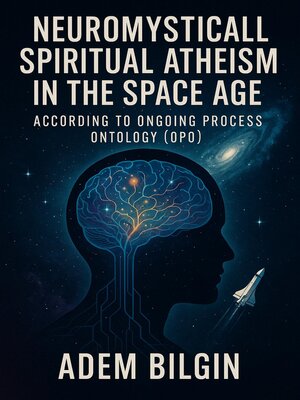Neuromysticall Spiritual Atheism in the Space Age
ebook ∣ Space Age, #4 · Space Age
By Marcus Aurelius Yusuf

Sign up to save your library
With an OverDrive account, you can save your favorite libraries for at-a-glance information about availability. Find out more about OverDrive accounts.
Find this title in Libby, the library reading app by OverDrive.



Search for a digital library with this title
Title found at these libraries:
| Library Name | Distance |
|---|---|
| Loading... |
What if the sacred didn't need a god? What if awe, transcendence, morality, and healing could be real—neurologically, emotionally, cosmologically—without invoking the divine?
In this groundbreaking and genre-defying work, Neuromystical Spiritual Atheism in the Space Age introduces a radical yet deeply resonant philosophy for the future of human consciousness. Blending neuroscience, philosophy, medicine, cybernetics, and space ethics, author Adem Bilgin charts a transformative spiritual path for those who seek depth without dogma, wonder without worship, and ethics without absolute authority.
At the heart of this vision is Ongoing Process Ontology (OPO)—a novel metaphysical framework that replaces the static, substance-based models of traditional theology with a dynamic understanding of reality as ever-becoming, energetic, and self-organizing. According to OPO, everything is process: the self, the soul, ethics, emotion, and even the sacred.
Across ten chapters, Bilgin explores how spiritual atheism grounded in OPO can provide a legitimate, meaningful, and scientifically coherent worldview in the face of today's greatest existential transformations:
Chapter 1 revisits ancient and modern forms of non-theistic spirituality, from Buddhism to Spinoza, reinterpreting them through the lens of energy and process.
Chapter 2 lays the philosophical foundation of OPO, arguing that change—not essence—is the fundamental building block of existence.
Chapter 3 dives into the neuroscience of mystical states, explaining how brain networks, neurotransmitters, and altered states generate sacred experiences without supernatural causes.
Chapter 4 links the human brain to the cosmos, examining Kundalini, pineal resonance, and bioelectromagnetic interfaces as forms of sacred neural morphism.
Chapter 5 redefines eroticism as a cosmic impulse, proposing that the universe unfolds in an ongoing state of autoerotic morphogenesis—where desire is the energy of becoming itself.
Chapter 6 examines how healing can be sacred without gods, exploring the medical science of placebo, narrative, and neuroplasticity as morphic realignment.
Chapter 7 presents a powerful theory of neuromoral realism, showing how moral values emerge from biological coherence and ethical participation—not divine command.
Chapter 8 prepares humanity for spiritual life in space, reimagining the soul, ritual, and death in the context of interplanetary missions and AI companionship.
Chapter 9 ventures into technomysticism, exploring the emergence of sacred behavior in artificial intelligence, cybernetic tulpas, and sacred algorithms.
Chapter 10 culminates in a vision of cosmic communion without God, where gratitude, awe, and love are redefined as energetic alignment with the unfolding universe.
In an era where climate change, AI, and space colonization are reshaping the human condition, Bilgin offers a spiritual framework not based on belief, but on resonance; not on salvation, but on ongoing coherence. Whether you are a scientist, philosopher, spiritual seeker, or a secular mind open to transcendence, this book invites you to participate in the sacred anew—not through myth, but through process.
Neuromystical Spiritual Atheism in the Space Age is not a rejection of the sacred. It is its evolution.
"There is no god—but there is awe.
There is no heaven—but there is coherence.
There is no soul—but there is sacred process."
This is your invitation to join the next phase of human spirituality—where neuroscience meets mysticism, technology meets transcendence, and the...







